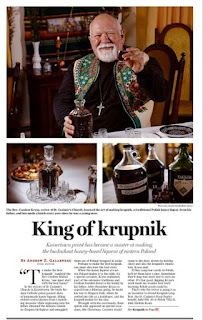How God Loves Us? Thru Jesus' Sacred Heart
Buffalo’s
Monumental Painter-Priest's Vision
Three farsighted pastors
of St Casimir’s orchestrated one of Buffalo’s most unique spiritual treasure-churches.
While St Stanislaus Church features Poland’s Baptism (966) and the first PolAm
settlement (1854); Corpus Christi displays a copy of Rafaelo’s Eucharistic Disputa
(100x plus larger than the Vatican
original); St Casimir’s continues to focus on art as a source of energizing beauty:
raising the soul and mind heavenward.
Fr Anthony Majewski’s,
with local architect Chester Oakley, desired to “celestially elevate” us from the drudgery of work and earthly street distractions (quoted from the 50th
Anniversary Album). They built America’s first ever Byzantine style Roman
Catholic church. The visionary pastor secures a Polish immigrant artist, Marian
Rzeźnik, to execute the sanctuary’s awe-inspired “Coronation Apse”—akin to
ancient Roman and Byzantine basilicas.
Years later, Msgr Ed
Kazmierczak obtained the “Christ’s Face from the Cross” (pictured abovce) directly from
“Buffalo’s painting priest” Rev Casimir Szarkiewicz, as a 1963 Courier Express
feature story dubbed him. Msgr Matt Kopacz with the local Świątek Sudios, embellished
arches with survival ornamentation of Istanbul’s Hagia Sophia Basilica (repurposed
as today’s Turkey’s great Mosque).
Following Msgr Ed, this
Kaisertown church recently acquired a stunning, life-size copy of Buffalo’s
immigrant-priest-painter’s Sacred Heart (top of article). Honored during the summer in St Casimir’s sanctuary,
this emotionally expressive, brilliant work commemorates June 2020: the month
of the Sacred Heart. Members and visitors are being drawn to this masterpiece.
Fr. Szarkiewicz depicts
Jesus as the source of light. Divine brilliance
emanates from His very chest. His stark, out to darkness, portrayal is balanced
by a mysterious, yet noble, lean face and belabored worker’s hands, distinguished
by priest-painter’s own experience of WWII suffering. Attracting the viewer, they
simultaneously display the intensity of Jesus’ thirst for us to “return the
favor” of his incomprehensible, unending, selfless love.
A captivating First
Communion hymn “O, mój Jezu w Hostyi skryty” (“O my Jesus, Host for me”)
musically paints a similar work. The believer
is moved to enter God’s authentic reality furnace: “I’ll bear anything for you
Jesus, even if the Cross inflicts painful threats. All I ask, I humbly beg you, embrace and hold
me in the silence of your heart.” Very different from the once familiar ditty,
“I am special” of past 1st Holy Communions.
Jesus’ billowing red coat
and ample white garment unleash the bounty of God’s endless and infinite mercy. Refulgent rays of light emanating from the
Lord’s heart emanate energizing waves of spiritual affection, solicitude, and
joy. These dazzling robes draw mystical meaning from its Divine Mercy
counterpart. Bleached in His precious blood, whitened robes and rays spring, as
on the first day of creation, from absolute darkness. The energizing glance drawing the believer r
to Him, through an, ever so slight, encouraging beckoning of the brow, discloses
Jesus’ keen interest to listen from the heart. I personally experienced this
same demeanor and authentic desire to lend an ear, during a conversation with St
John Paul.
The painting’s face and
heart are naturally, even rustically realistic. A divided, elongated drop bleeds from the spot where
the guard inflicted the final, mortal wound. Its upper aorta emits a soft, vigil flame of
burning love. The Lord’s pierced wrists finished off with similar slight, elongated
streams of blood reflect His injured heart: subtle soul therapy.
This convincing depiction
differs from “pale, limp or wilting” versions of long-gone eras. Like the 1st
Communion hymn, this painting presents a true-to-life, credible portrait, drawing
the contemporary believer into an intense, loving relationship and deep
meditation.
The painting displays St
Casimir’s preference for the energy and power of true beauty from the divine
Person to the human transformed by supernatural light (of the afore-mentioned
hymn). For these very reasons “Buffalo’s painting priest,” who on numerous occasions
during WWII evaded the dark machinations of Nazi occupiers, presents a healing and
exceptionally solicitous Sacred Heart. It is a spiritual compress for the
polarizing, self-absorbed, reaching for violence, bullying, terminating brutality,
addiction, destruction and death as poisonous suicidal potions.
A recent pilgrimage to
the American Czestochowa Shrine, afforded me the opportunity to offer a prayer
of thanksgiving at Fr Szarkiewicz’s grave, resting on the Avenue of Heroic Priests (pic above).
 |
| The “painting priest’s” Sacred Heart in St Casimir’s summer shrine. |




Comments
Post a Comment